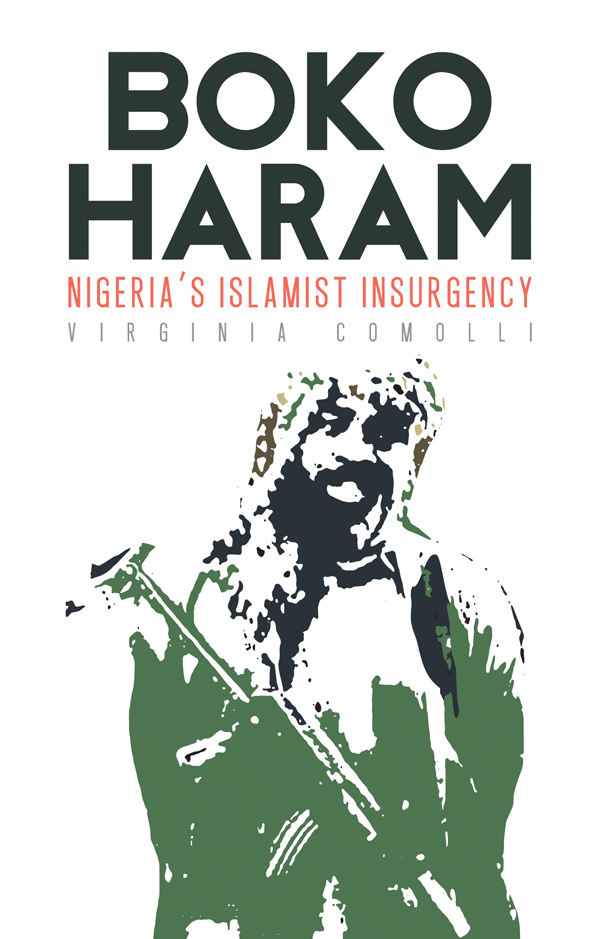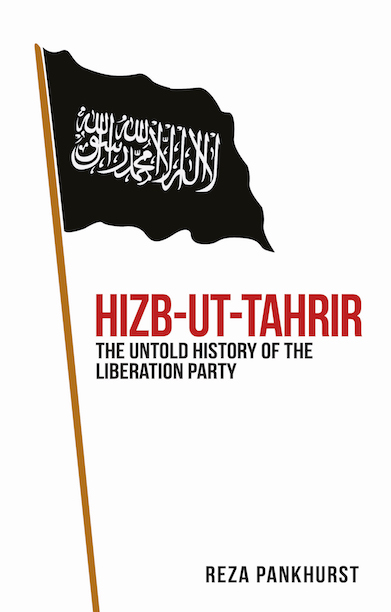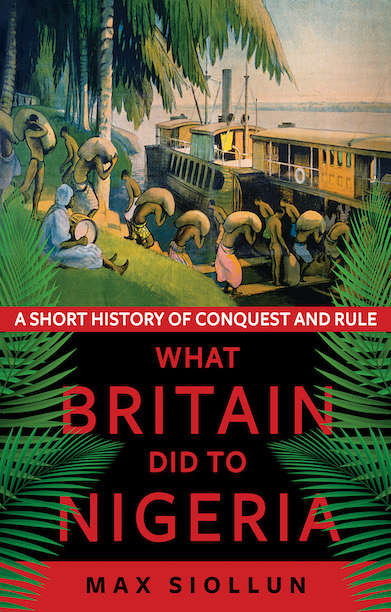Boko Haram
Nigeria's Islamist Insurgency
‘Virginia Comolli’s book, lucid and well informed, has to be considered the standard work on Boko Haram, a movement of fast-growing importance.’ – Stephen Ellis, Desmond Tutu Professor, Free University, Amsterdam
Description
Northern and central Nigeria have been engulfed in a violent insurgency campaign waged by Jama’atu Ahlis Sunnah Lidda’awati w’al Jihad, a.k.a. ‘Boko Haram’, and for a time, its splinter group ‘Ansaru’. From its inception an inward-looking, almost parochial, movement, Boko Haram, and even more so Ansaru, have now shown clear signs of regionalisation, expanding their operations across West Africa and forging links with al-Qaeda affiliated groups. Boko Haram’s stated aim is to Islamise Africa’s most populous country but, like earlier Nigerian Islamist groups, of which there is a long tradition in the Sahel, the discontent prompting young Nigerians and other young West African Muslims to join the insurgency is rooted in more than just religious orthodoxy and cannot be disentangled from their economic, social and political marginalisation.
In spite of talks about dialogue and amnesty for those prepared to renounce violence, the Federal Government’s response has been a militarised one, resulting in the largest deployment of the Nigerian armed forces since the end of the Civil War. But what is the real magnitude of the threat? What can foreign partners do to support Abuja? How effective is the current government’s strategy in tackling the insurgency? And, more importantly, are the root causes of the insurgency being addressed and the foundations for a durable peace being established?
Reviews
“The book is well written and reflects the author’s deep familiarity with Nigeria, making it a valuable contribution to the literature on Boko Haram.” — Perspectives on Terrorism
‘[A] rich scholarly engagement on the subject which even non-academic readers will find interesting … Comolli’s analysis, based on three years of extensive field research and incredible access to major stakeholders, offers a comprehensive account of the Boko Haram movement … [the book is] a significant reference for scholars and students in search of a historical context for the evolution of not just Boko Haram but also of the recurring trend of radical Islamic militancy in Nigeria.’ — Africa Studies Review
‘Virginia Comolli’s book, lucid and well informed, has to be considered the standard work on Boko Haram, a movement of fast-growing importance.’ — Stephen Ellis, Desmond Tutu Professor, Free University, Amsterdam and author of External Mission: The ANC in Exile, 1960-1990
‘Combines detailed research with rigorous analysis. … Virginia Comolli traces the origins and evolution of Boko Haram as a local, regional and transnational security threat, conveying in clear and accessible terms the complexities of this poorly understood phenomenon.’ — Nigel Inkster, Director of Transnational Threats and Political Risk, IISS
‘[Comolli’s] book is a thoroughly researched and carefully judged antidote to the very shallow media and Nigerian government explanations for the insurgency. In immense detail, with a very full bibliography of sources and much original interview material, Virginia Comolli has assembled much fascinating and illuminating information on the historical, cultural, political and socio-economic roots of the movement and its relationship with mainstream but also sectarian Islam in Nigeria.’ — Keith Somerville, Senior Research Fellow, Institute of Commonwealth Studies, University of London, in African Arguments
‘Virginia Comolli’s book will be invaluable to policy makers confronting the challenge of Boko Haram. Her approach is comprehensive and critical. Her exposition of the theological roots of Boko Haram and their northern Nigerian setting provides a new and more sophistical level of analysis of where the movement comes from and where it is going.’ — John Campbell, Ralph Bunche Senior Fellow for Africa Policy Studies at the Council on Foreign Relations (CFR), New York, and former US Ambassador to Nigeria
‘Virginia Comolli’s book is a must-read for anyone seeking to understand Nigeria or militant Islam in Africa. Grounded in the political history of the country and in local social, ethnic, economic, and ideational context, Virginia’s analysis debunks facile stereotypes about Boko Haram and the pan-jihadi threat in Africa and dissects the multiple causes of the insurgency, its shape, and evolution. Of high policy relevance, the book persuasively shows how long-term as well as current policies of the Nigerian government generated many of the root causes of the discontent of Nigeria’s north and worsened the insurgency.’ — Vanda Felbab-Brown, Senior Fellow at the Brookings Institution and author of Aspiration and Ambivalence: Strategies and Realities of Counterinsurgency and State-building in Afghanistan
‘Boko Haram is one of the fastest evolving Islamist militant movements in the world today. In the span of just a few years, it has transformed itself from a localised group active in a remote corner of Nigeria into a full-fledged insurgency threatening not only to Africa’s most populous country and its biggest economy, but also the security of the subregion. Virginia Comolli’s book offers both policymakers and analysts a comprehensive introduction to an increasingly important, but poorly understood, phenomenon, one rooted in cultural history and religious belief as well political, economic, and social marginalization and the failure of governance. Even those who will find themselves at disagreement with some of the author’s conclusions will nevertheless find her meticulous exposition an invaluable resource.’ — J. Peter Pham, Director of the Africa Center, Atlantic Council, and Editor-in-Chief, Journal of the Middle East and Africa
‘Boko Haram: simply the latest in Nigeria’s many millenarian movements, or something new? Virginia Comolli offers unique insight into the Islamist movements origins, while providing answers to other key questions: Why has the Nigerian army has performed so poorly against this threat, and how might Boko Haram be defeated?’ — Greg Mills, Director of the Brenthurst Foundation, Johannesburg, and author of Why States Recover: Changing Walking Societies into Winning Nations, from Afghanistan to Zimbabwe
‘This book combines detailed research with rigorous analysis as it traces the origins and evolution of Boko Haram … It conveys in clear terms the complexities of the Boko Haram insurgency, as well as the pitfalls encountered by the Nigerian state’. — H.E. Mrs. U. Joy Ogwu, Permanent Representative of Nigeria to the United Nations
‘[This] is an expertly analysed work which successfully condenses the myriad of information on Boko Haram …, making it into a compendium for referencing by “Boko Haram-watchers”.’ — Africa at LSE
‘[Comolli] provides a more detailed portrait than any of her predecessors of the history and personality of the movement’s founder, Mohammed Yusuf. … Comolli has written an interesting book filled with new information and ideas. Especially noteworthy is her explanation of the cyclical nature of militant movements in Nigeria. Moreover, there are many important details that are revealed in the numerous interviews she conducted. Comolli’s work is a comprehensive, well-documented piece of scholarship and presents readers with an impressive analysis of Boko Haram.’ — Israel Journal of Foreign Affairs
‘It is valuable to have Virginia Comolli’s thoughtful and wide-ranging account of [Boko Haram], which draws on extensive conversations with Nigerians of many backgrounds, apart from archival work. … Surprisingly, many aspects of this strictly contemporary movement are fiercely debated and poorly understood, and Comolli is a sure-footed guide through the scholarly battlegrounds.’ — Books & Culture
‘Comolli’s informative book situates Boko Haram … within the complex history of the various radical Islamist groups that have long existed in the area and explains how the group’s brutality increased after the death of its founder, Mohammed Yusuf, at the hands of Nigerian security forces in 2009.’ — Foreign Affairs
‘Comolli’s book will surely become required reading for anyone seeking to understand Boko Haram, particularly policymakers. It provides one of the few researched studies on Boko Haram, and where there are conflicting interpretations, it presents a synopsis of each, which serves as a literature review that will be useful to other researchers.’ —Isaac Kfir, Journal of Islamic Studies
Author(s)
Virginia Comolli is the Research Fellow for Security and Development at The International Institute for Strategic Studies (IISS) in London.






